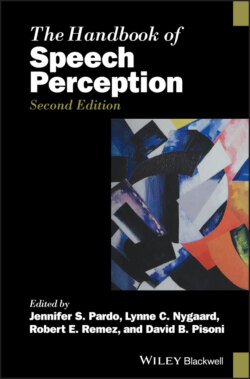Читать книгу The Handbook of Speech Perception - Группа авторов - Страница 58
Perceptual feedback processing
ОглавлениеThe study of the perceptual control of spoken language is an investigation of how behavior is monitored by the actor. Feedback can be viewed as a general process wherein online performance is referenced to a target, goal, or intention. When deviations from these targets are detected, these errors are ideally corrected by the speaker. In language, such errors can take numerous forms. A speaker’s meaning might be poorly formulated and misinterpreted by a listener; a single word might be substituted for another or words might be spoken out of order; single syllables or sounds might be dropped, emphasized incorrectly, or mispronounced. Monitoring of such language behavior is often broadly conceptualized according to a perceptual loop (Levelt, 1983). The perceptual loop model was designed to account for perceived errors at various levels of language production, and consists of three phases: (1) self‐interrupting when an error is detected, (2) pausing or introducing “editing” terms (um, uh, like), and (3) fixing the error.
Two broad features differentiate such high‐level error detection from other forms of target‐based correction, as in speech production. First, language‐error correction often interrupts the flow of output, while the same is not always true of compensation in response to auditory speech feedback perturbations. Second, language‐error correction typically involves conscious awareness. This is inconsistent with speech feedback processing.
Two bodies of literature – clinical studies of hearing loss and artificial laboratory perturbation studies – shed light on these unique features of speech feedback processing.
